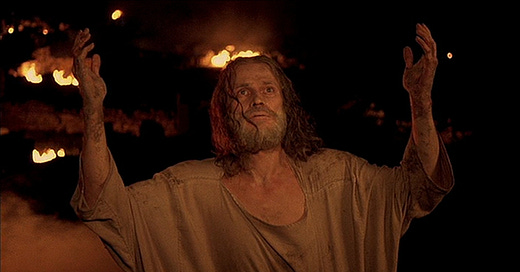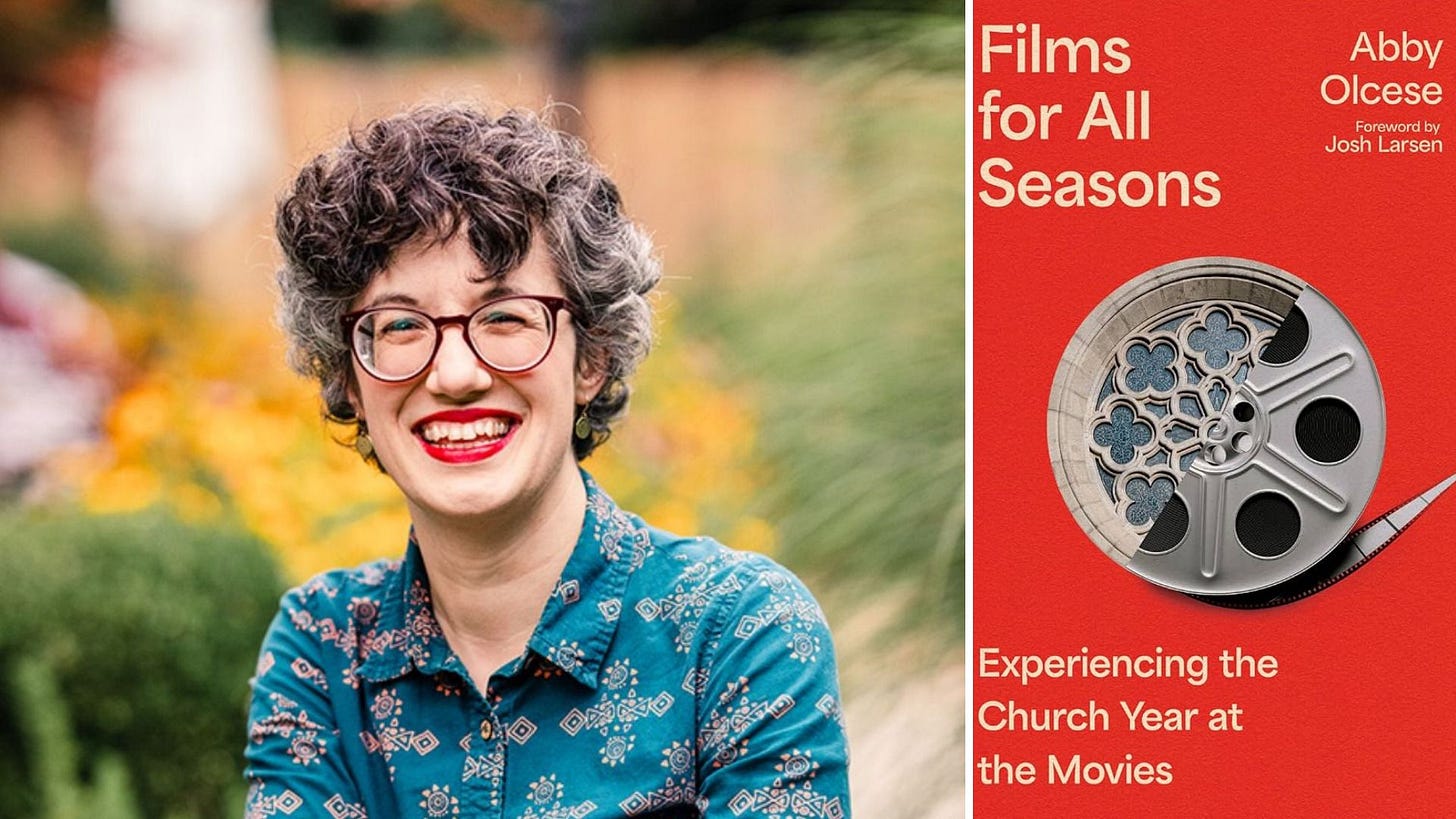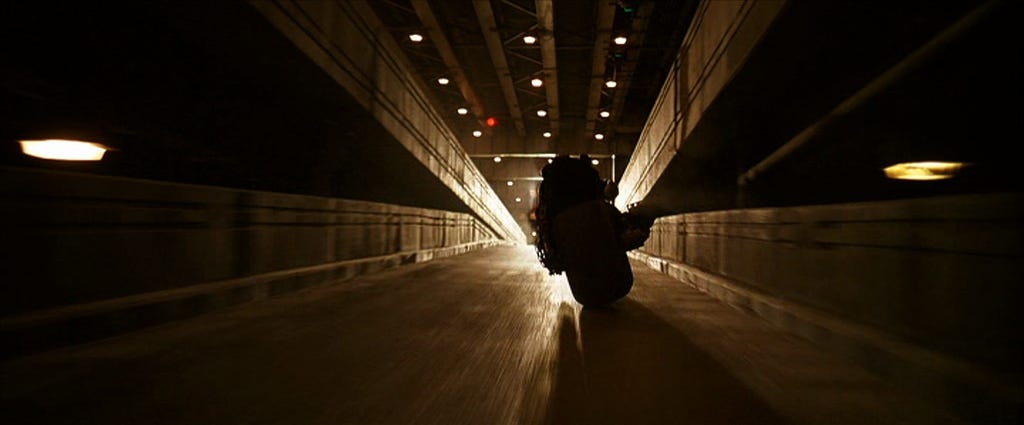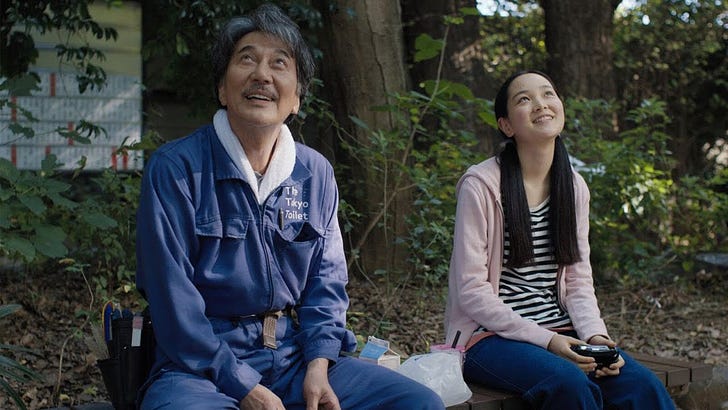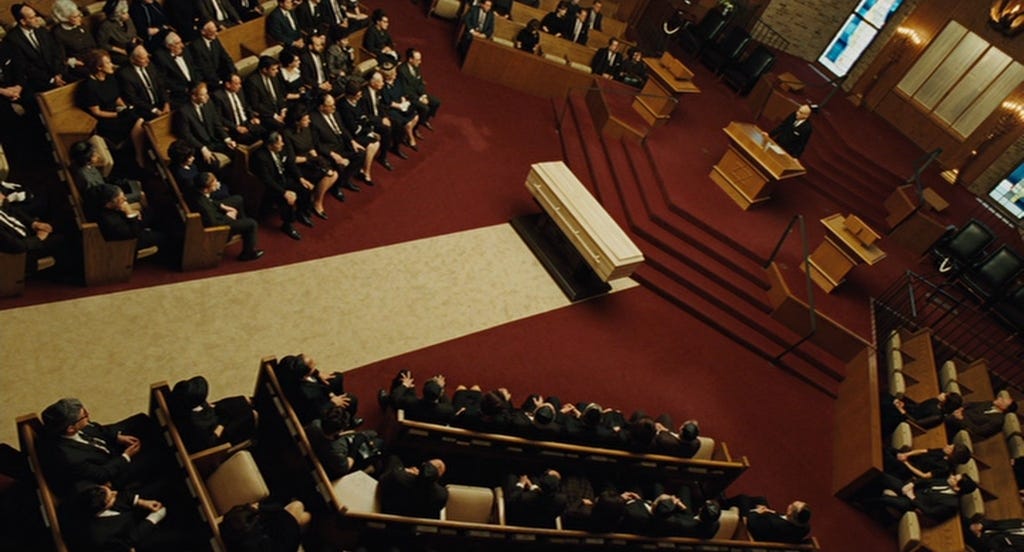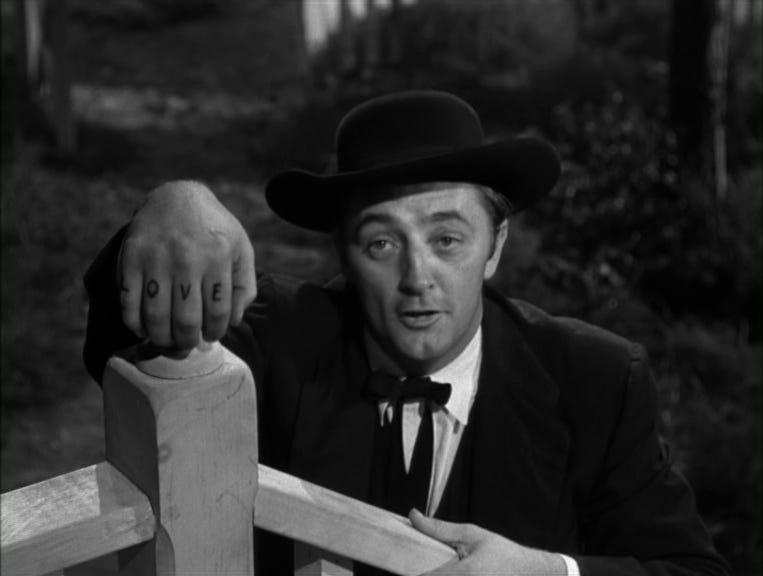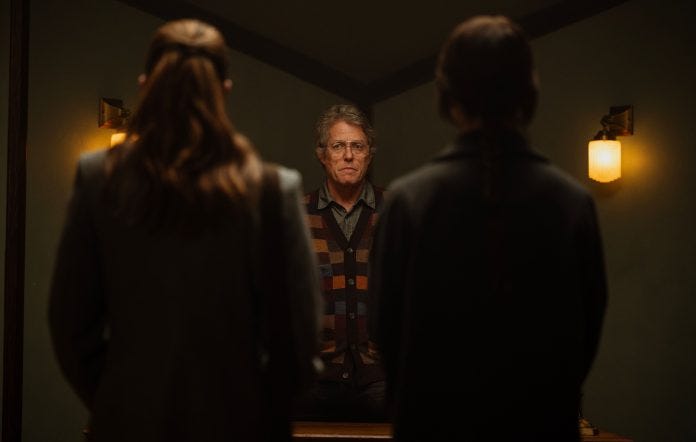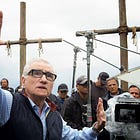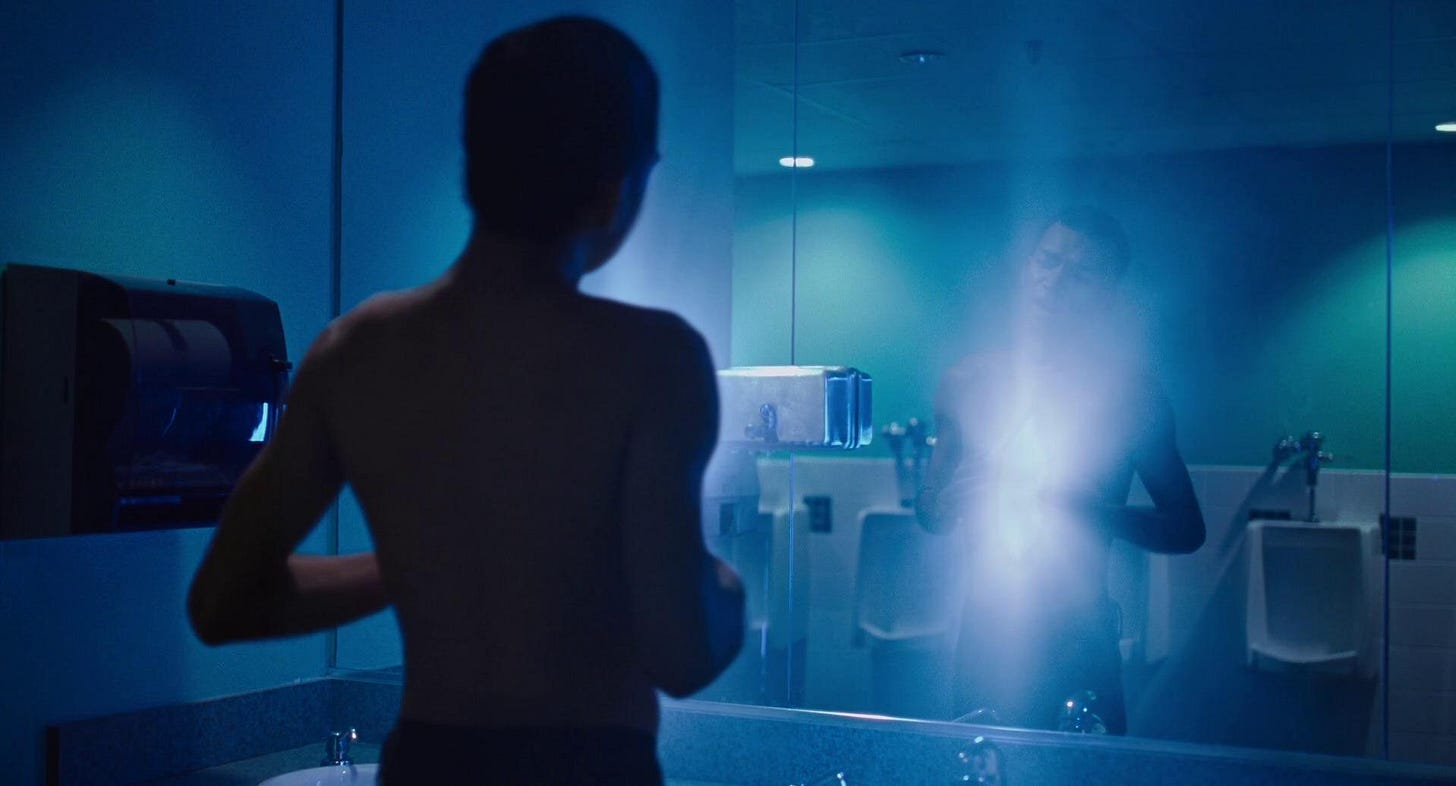Somewhere on the road between Kansas City and Columbia, MO, the film writer (and my friend)
told me about an idea she was working on for a book. Now, Films for All Seasons is available for you to buy!As Christians enter the Advent season in anticipation of the celebration of Jesus’ birth, marking a new year within the life of the church, I thought it was the perfect time to catch up with Abby about her book. Films for All Seasons maps to the church calendar as Abby analyzes a film as it pertains to the scriptural teachings that accompany the holiday or observance.
Admittedly, I’m going to savor read Films for All Seasons over the next year rather than binging it — and if that sounds like an agreeable experience to you, now is the time to start! Paid subscribers will be able to read our full conversation in their inboxes.
If you’re not quite ready to make that commitment, at least keep an eye out for Abby on Bluesky or at one of her many outlets — including The Pitch, a magazine and website covering the Kansas City area, where she serves as their film editor. She is also a contributor to Sojourners Magazine, Think Christian, Paste, and Roger Ebert.
I was lucky enough to know you near the genesis of this project and have seen it blossom from the seedling stage, but for others who might be less familiar, how did this process come about?
This book started as an article series for a website that I write for called Think Christian, and that website is run by Josh Larsen, a great film writer in his own right who's co-host of the Filmspotting podcast. He had the bright idea during the pandemic to commission me to write a series of articles of film recommendations for people to watch alongside major church holidays. As you know, we were in lockdown and a lot of churches were doing online services only, so there was a lack of experiences that people got to have around church holidays. Films are a fun way to, either with your family or online with friends or with roommates, watch and discuss stuff together. I did one for Holy Week that was successful, and so I just started doing more; there were only two or three holidays that I ended up not covering in that series.
And then after I'd done that for about a year, it just struck me all at once that this was a book outline! The structure was already there, and the idea and the outlining were basically already done, which was cool. So all I needed to do was put that together into a proposal, which was honestly what took the most work because I'm terrible with self-imposed deadlines.
You raised the idea of this book starting as something of a substitute for spiritual formation. The example that's often given for the symbolic equivalent of communal movie watching is Plato's Allegory of the Cave, but do you see any similarities between the ways in which people gather to worship and the ways in which people gather to watch a movie?
Yeah, ideally! People like Quentin Tarantino like to talk about movies as church, and I think in a way that that is true when that experience is working at its best. If nobody's on their phone and everybody's fully engaged in the movie, those moments can sometimes feel really spiritual in how special they feel. I feel like all of us have at least one or two stories of times that we've been in a theater and experienced something really magical. I remember when The Dark Knight came out in college, and I watched it in my hometown with a group of people. Everybody in that theater was somebody that I probably knew at one point. To be in a room with all these people and have this dramatic experience together, then the lights go up at the very end as the credits start rolling, and the guy behind me was a friend from high school drama club just stands up and goes, "Now THAT was a movie!" And I was like, "YES!"
Those moments really feel like you are having an experience together, the ups and the downs and the surprises. And I think that that can be really similar to how we worship together in that we're reacting to something as a group, but within that group, there are individual experiences that are each part of it. That's the fun part of having the conversation afterward, right? "What did you think of this? Well, I thought this, I felt this, these things came up for me." And hopefully, if you're listening to a good sermon, you end up with a lot of follow-up ideas and questions. My church tends to use a lot of references, which I'm very grateful for because I ended up using most of them in my book! But usually, it's just inspiration for further exploration and reading. When you see a good movie, that's that's often how I feel, too. I'm curious about some of the stuff I saw; I'm curious about some of the references or influences that I think I picked up on, and now I want to know more. If there's a specific thing that really surprised me, I'd like to know where that came from, so that I can dig in and further my own understanding as a viewer.
Do you ever feel like your writing, consciously or not, might sound like or be structured like a sermon?
I think I saw somebody tweet once that there was a pipeline between people who enjoyed writing research papers in high school or college and people who became journalists and film critics. And I was like, "Yeah, that's basically me." I like the research and structure part of it, and the idea of having a thesis statement and then arguments that back up that thesis ... which is essentially how most sermons are structured, too. I think that's in there, but I don't mind it. I kind of like it!
How did you go about identifying the movies that you chose to illustrate the church calendar? Were there any other contenders beyond the appendix with supplemental watching?
I'd love to say that I have just like this deep backbench of stuff, but these are the hits. These are movies where I've thought this way about them for a really long time, so it was really fun to be able to include them. There have been a couple of things that have come out since — you and I have talked a little bit about the growth of what you called "Peace Cinema." I think about them as Ordinary Time movies, and I feel like that's something that I've been thinking about a little bit more with movies like Janet Planet and Perfect Days that are really just about presence. I find a lot of depth in that.
When my editor came back and was like, "How about an appendix?" And I was like, "HUH!? I have to do MORE of these?" But there was a challenge in that. I've had my comfort zone, and a lot of these are movies that I'd thought about for a long time or written about multiple times, so now I needed to push and expand. My little writing group of Sarah Welch-Larson, JR Forasteros, and Joe George was a great sounding board every step of the way. I could just text them and be like, "Guys, is this a thing?" And they'd be like, "Yeah, actually!" Or I'd be like, "I need to come up with another movie for the Ascension Day chapter, but I'm coming up empty. Whadda ya got?" They had really great recommendations. I think it's been a group effort in more ways than one. This is something that was definitely made in a community mindset. I'm trying to open my mind that there are more out there. I always get excited and inwardly vibrating when I see something that really fits the mold.
What's your process of finding the sacred within the secular, if you have one? How do you bridge that divide?
I am actually curious to hear how other people think about this, so you tell me tell me how that makes you feel, and then I will riff off of that.
It's interesting, and maybe part of it too is my mixed-faith background. My dad is Jewish but my mom is Christian, and I was raised in the Christian faith. Because I see part one and part two, let's say, of the Abrahamic faiths, I think I have a certain ability to think beyond the text toward what it anticipates. I see in a lot of Jewish filmmakers like Woody Allen, The Coen brothers, and James Gray who make these films that are rooted in a divine presence who remote and inaccessible to us. They perform a certain introspection required from knowing these texts, stories, and ancestry that we hold ... but anticipating something further. I'm able to project on in these instances what I know, for me is that further thing.
Hannah and Her Sisters, Crimes and Misdemeanors, or A Serious Man are films that are crying out for the salvation that is found within the Christian faith. My approach is taking that next step and thinking about what's beyond. Sometimes, filmmakers approach a subject by saying, "Here are these conundrums of human life that don't have an answer or solution," and I think, "Okay, I think I have some semblance of what can fill that void." That's not a process, necessarily, but is how I think through these films that are not coming from an overtly spiritual lens or a place of religious dogma, but from just belief in general.
That's a great place to start, and saying that it's not really a process, I fully agree with that. I've described it as a kind of synesthesia, in the book and to other folks as well. It just triggers a sense in me. For me, as a kid, it started emotionally. In the book, I write about going to a Maundy Thursday service in high school and for the first time being really struck by the narrative power of that moment in in the garden: how heartbroken and angry the disciples would have felt. Like when you hear a good song that has a lot of yearning in it, and you're like, "Oh man, yeah, I resonate with that. But what's the ethereal thing that I'm trying to get at here?"
For me, what I hit on was like, "Oh, it's because I've read this in stories. I love it when it happens in stories because it usually means that something really important is about to happen, dramatically or personally, for the characters involved." It probably helps that I grew up reading a lot of fantasy, and so that kind of structure was something really deeply ingrained in me. This was around the time that The Lord of the Rings trilogy was coming out, which was super popular. I could pinpoint the exact last time that I had felt that way was watching that movie in the theater when the Orcs attack, Boromir dies, Merry and Pippin are taken captive, Sam almost dies, and there's just a lot of feelings and uncertainty going on. And I was like, "Yeah, this is an emotion that I really like living in." And I think I like living in it because there is, for me, some truth in it. That comes from an ultimate truth, for me. And then I started recognizing those questions, like you mentioned, in other films. The Coen brothers are a great example because I think they're pulling a lot from their Jewish background in terms of morality and questions about the meaning of everything.
That further became like, "What, contextually, do I know about the people that made this movie, either spiritually or just what their interests are in general?" One of the great unifying things for me in art is that no matter what your background is, a lot of us are trying to figure out the same stuff. We have the same questions about morality and joy and pain and suffering and the meaning of everything in the world. We're all trying to figure out what it all means, why it happens, what we can do to make the world a better place, and what our responsibility is in doing that. All of that, for me, comes from God. I don't want to belittle anybody else's background on that, but there's a part of me that's just like ... even if people don't know what they're doing, on some sub-level, I like to think that that is what it is. That God is somewhere looking down at that and being like, "They'll get there."
For me, usually, it's something that hits all at once. Sometimes, it's like a theme, a line, or a shot that shows up and just makes it all come to a point for me. Bad Times at the El Royale, which is in the book, started for me almost immediately. You see the hotel, and it's a place between two states ... this is purgatory! Okay, great, where are we going from here?
How have you evolved your perception of seeing parallels between the secular and the sacred with art and religion? For example, I think you can apply a lot of the same critical thinking skills from analyzing a film as you can to performing exegesis on a Bible verse.
I am very lucky to go to the church that I go to because we're really big on we're really big on context. I was doing a book event right after the release of the book, and my friend Brock, who grew up attending but is no longer going to church, was moderating it for me. I was talking about the benefits of the church that I go to, and he was like, "Wait, so your church teaches media literacy?" And I was like, "Yeah, pretty much!" Context is really important: who is the person who wrote the Gospel or the book of the Bible that you are reading, what was their background, who were they writing for what was going on at the time? That's not to discredit any of it; all of it is to kind of give you a sense of the specifics of why they say certain things a certain way. Why is this gospel structured differently from this gospel? Why is there an emphasis in Luke on the poor, hungry, and oppressed? Why is Mark so brief, frank, and sometimes really awkward to read? Why is John so literary and flowery? I feel like these are questions that you would have if you're if you're reading the Bible really closely, right? Why is this subtly different from this? Fortunately, there's an entire genre of writing dedicated to specifically that, which is great!e
Fortunately, there's a lot of writing on film theory, too, and how to read things through a certain lens. Context is important for film as well: who made the movie, when it was made, what audiences at the time were thinking, questioning or fearing, and how does the filmmaker either complement or contrast all of that?
A lot of classic films, you can point at specific things about the way the studio system worked, the level of American patriotism at the time, and what values were, so that dictates what you can and cannot show on screen. That dictates the kind of stories you're going to see. When you get to New Hollywood, you're thinking about who's making these movies, and it's all of these alternative folks, young nerds, and hippies who are coming together and making the stuff that they want to make. A lot of it is in direct rebellion of systems that existed previously, and that was going on at large in the culture at the time.
You get stuff in the '80s, and it's everything from paeans to the greatness of capitalism to comedies about the nuclear bomb fear that was going on constantly all the time. You even get stuff like Real Genius, which is a wonderful, goofy adventures in college movie, but it has this genuine fear about the bomb that's in the back of it all the time. That was a thing that people were thinking about and questioning constantly. There's been more talk recently, I think, of the pre-and-post 9/11 movie and how you can see that reflected in the culture.
All that is to say, I think close reading, context, and literacy of any kind, whether it's media or biblical, doesn't ruin the experience. I think it deepens the experience, for me at least. There's the initial wonder of, like, "I'm really excited that this thing exists" or "This story is really powerful to me." Then, the more digging that you do, at least for me biblically, where you find out what was actually going on makes that story hit harder because you get to know the characters better. You get to know their relationship with God better.
Was there any shame you had to work past by putting the stories of film and the stories of the Bible on a similar footing for analysis? I think it’s possible to hold space for divine inspiration in the text while also analyzing the Bible as another method of people using storytelling to understand and explain the unexplainable things around them.
I've tried not to read too many reviews because I fear it's just going to make me mad. My mom did send me one where she was like, "The review was positive, but the comment section was all like, 'She needs to read the Bible.'" And like … I do, dude! The Bible is quoted in the book. I come from the approach that the Bible is divinely inspired, that there are true things in it, and that it's a number of narrators telling their perspective on stuff that did happen. And some of it is prophecy, so some of it literally did not happen. Some of it is poetry, and so some of it is genuinely just feelings. So in that sense, it's a larger story made up of many smaller stories in the same way that a history textbook is also a large story made up of many smaller stories ... and also has the imprint of its author and the context of the time it was written. There's stuff that gets left out of our history textbooks that needs to be included. Even if you are reading something true, you're reading something that is a version of the truth. You are not reading the truth itself.
That's how I've come to understand the Bible: these stories have a lot of power and are based on something true, but these stories are all filtered through somebody's perspective for the perspectives of other people. And so it's worth trying to understand what those things are because when you do, you get a fuller understanding of what the truth is. Or, you get closer to it in the sense that none of us are actually going to know the entire truth on this side of eternity, but we can get closer to an understanding. I think that's great, actually. I like not having certainty and a little bit of mystery because I feel like that's where faith comes in. You have to believe in some element of the truth, otherwise, why do you have it?
I always think of the great sermon quote: "Doubt isn't the opposite of faith. Certainty is."
I don't think we've talked very deeply about Heretic, but that's the thing that I really liked about that movie. Certainty and control are just things that you can't have all the time, and I think a lot of people really fear that. People really look for certainty and absolute truth in religion, and gooooood luck to them. I think you're probably going to find moments of comfort in that, but you're never going to find absolute comfort. I find a lot of excitement, and also comfort, in the fact that I'm not always going to have all the answers, but God does. God sees things at a level that I do not, and so I'm okay with putting my trust in that force and just letting it go and being willing to be an instrument in the places where I feel like I can be part of that journey in some kind of imperfect human way.
I haven’t gotten to your chapter on The Last Temptation of Christ, but I’m sure that was a particularly fraught selection. How do you feel about reading spiritual lessons out of films that challenge the authority of biblical text?
That essay is a little bit longer because I spent a little bit of extra time kind of justifying its inclusion in the book. I was just hanging out with my parents and talking about the movie Silence, and they found some quote from Philip Yancey [an author on spiritual matters] writing like a reaction to the news that Martin Scorsese was going to do an adaptation of Silence. And he was kind of like, "Oh man, is Scorsese the right guy to adapt Silence? Because he did The Last Temptation of Christ..." and I was like, "Dude, you are smarter than this. Come on. I know that you're not dumb, and I know that evangelicals have this relationship with their precious Silence."
They love it a lot, but it's about Jesuit priests and Martin Scorsese was almost a priest! And he's pretty Catholic. In the context of Last Temptation of Christ, Paul Schrader went to Calvin College and was Episcopalian at the time that he wrote that screenplay. These people grew up in church, followed it as adults, and still practice it. These are your people, sorry if you're having an issue with that. So that's where I start.
This is a legitimate spiritual exploration from people who have been listening to these stories their entire lives and have questions. They found this very interesting perspective on the gospels that they thought they would try to use to interrogate it and ask some big questions, and more power to them. But I think it gets back to that literalism thing that we were talking about. When you start asking questions about that, I feel like it starts to reveal that perspective for what it actually is. I think that gets that gets people up in arms, afraid, and really defensive because they're just not ready to have that interrogation. Because if you do, it requires work, for one thing, and a lot of people don't want to do work. (I understand; I'm very lazy.) That sort of intellectual journey can be really thrilling and exciting if you open the door for it. So that's the lead-up to that.
I'm always really interested when it comes to movies that Christians have had really strong reactions to because 90% of the time, they're coming from people that have a faith background of some kind asking genuine questions about the stuff that they were raised with. It's really telling as to what has worked for and has not worked for them, and where they are now. Life of Brian is a really good example of that as well. If you watch the interview with John Cleese, Michael Palin, Malcolm Muggeridge [a prominent Christian author], and Mervyn Stockwood [the Bishop of Southwark], they missed completely what they were on about. [AUTHOR’S NOTE: The video is linked below.]
Life of Brian is not a sacrilegious film; it's a satire of organized religion. It's an example of what happens when people witness an extraordinary thing and then decide to make it theirs, and the rules that they build around it are not divine. They're completely human-oriented, and that does get ridiculous very quickly. These are six guys [Monty Python] who were raised in the Church of England and, by the time they reached adulthood, found that those teachings didn't resonate with what they felt, what they experienced at all, and that's a failing of the church. That's an opportunity for the church to kind of look at itself and be like, "Oh, we're really out of touch! Some things about this fundamentally don't work, and maybe we need to readjust how we're having this discussion with people who aren't of our older, super traditional generation."
My answer to your why is The Last Temptation of Christ in this book is even longer than the essay itself! All that is to say I find a lot of power in art that asks genuine questions, and sometimes in very upfront ways like The Last Temptation of Christ does, about this strongly ingrained, established narrative and goes deeper on it. "What would it actually feel to be both fully God and fully man, to know that you have these divine responsibilities, yet also be a dude with a crush on a woman and really want it to work out but also can't because you're God? What if I say the right thing? What if I say the wrong thing? What if I incite a riot? I still have responsibility for this [situation] that I have to deal with on a human, emotional level, while also knowing that this is the job." That's fascinating!
That's the thing I really want to see displayed on screen, and that's what they do in that film. It's not saying that anything is true or untrue. It gives you a very emotional perspective on what that might be like and, in turn, makes the crucifixion story even more powerful because you understand a version of all the emotional choices that go into following through with that plan instead of just passively letting it happen.
We don't have a first-person account of Jesus. We have his words, but we don't have insight into his psychology. It's only natural that someone who is arguably the most influential figure in the last two thousand years on this globe is someone whose head we'd want to get inside!
Exactly! "What, Jesus had feelings?!" That was something I think was really lacking from my spiritual education growing up. In a way, that kind of makes sense because that's a hard thing to communicate to a kid, but the result was sort of like this weird kind of Goofus and Gallant theology. A lot of us identify with Peter in the gospels because he's a great audience surrogate as a guy who really wants to do the right thing and whose heart is in the right place, but his head just isn't quite there. Or, his head is there, but it's very culturally- and earthly-minded because that's the set of tools he's been given.
I remember feeling like the disciples got scolded a lot, and I would read a story in the gospels thinking, "Well, somebody said this, how is Jesus going to react? How is this wrong?" And I don't think that's very healthy! I don't think it's very empathetic. I learned how to disentangle that a little bit the older I got, but one of the things I like about Last Temptation of Christ is that it makes all of those characters dynamic. It makes it go beyond the good/bad or do this/don't do this and more deeply explores why you would want to do thing #1 vs. thing #2, what that struggle is inside of you, the attempt to make it work, and how we sometimes fail.
What’s the balance between using these films as a springboard for discussion without treating them as merely the vessels for a message?
If you do just like a specific belief delivery system, you get Angel Studios [maker of Sound of Freedom]. And those aren't really good for anybody because they're not good art, for one thing; I think good art allows for a variety of interpretations. But it's also not even really a great ministry tool because, mostly, it's just preaching to people who already believe that stuff. Not to say that people who don't believe things are smarter, but most of my most intelligent friends don't go to church! [laughs] It's not necessarily meeting people where they're at, I guess, is the point. It's not offering people an entry point to question or be willing to kind of doubt stuff and go deeper because a lot of the times they're coming from a perspective where it just doesn't allow for that.
The way that I write about the movies in this, they end up conveniently fitting certain themes of the church year. But, in general, they're broader. There is more than one way to read these films, but this is just the one particular way that I have found some of these themes and how they slot into the way that I think about parts of the church year. Some are a little bit more explicit in their metaphor; Children of Men is one. I feel super dumb that it took me that long to realize it was that obvious. Josh [Larsen] likes to talk about it as a Christmas movie often. He's written about it and talked about it on the podcast a lot, and I was like, "Yeah, I guess it is." And then I watched it thinking, "I need a Christmas movie. We've talked about this as a Christmas movie, and I know that it's got some elements in there. So I'm just gonna rewatch it and think about that." And it's like it's there from the very beginning! [laughs]
It also helps that it's like it's coming from a novel by a Christian author, P.D. James, who was probably doing it with that in mind. So that's an allegory that is just there, but on top of that, I appreciate that Alfonso Cuaron builds all of this other imagery that doesn't make that central allegory less strong — it just takes it in different directions and introduces other themes. Some of them are universal and constant; some of them are really specific to that period in time, like all of the images in the refugee camp when they enter that look like Abu Ghraib. That's there by design. There's all kinds of stuff in there that adds complexity to the central story ... and the central story is VERY pointed. But even when something is supposed to be directly about something, talented directors add so much on top that it's possible to look at it in a lot of different ways and add your own experiences and your own questions on top of that.
Have we chatted since the Greta Gerwig Narnia adaptation was announced? I'm so curious how those are going to turn out!
I got nothing, man, I don't know where that's gonna go!
I think of her as someone who is not explicitly a religious person, but someone who has a deep respect for it that can broaden the conversation around the films.
When it was announced that she was going to make the Barbie movie, I had a similar reaction where I was like, "I genuinely have no idea how that's going to go." And it turned out great, so I'm willing to trust her on that and be like, "She knows what she's doing." I feel like this is a really weird combination of filmmaker and material, but honestly, go for it. I'll watch it. We'll see how it goes.
I grew up reading the Narnia books, and I love them, obviously. “The Last Battle” was a really profound experience for me as a child because it's such a tragic book. I had this really long conversation with my mom after finishing it where I realized that the soul and the body were different things for the first time, which is a lot to handle for an eight-year-old. But I don't necessarily hold them as sacred texts. I wrote in the book about The Lion, The Witch, and The Wardrobe, and one of the things that I really like about that movie is that it added depth to the character of Edmund that I just wasn't getting as a kid. Again, it ends up being this Goofus and Gallant theology in the book a little bit. It's a fairy tale for kids. I get that. But there was a part of me that was just like, "Man, why bother with that kid? Why is he so bad? Why is he just so deeply annoying?" That kid sucks!
Getting to watch the movie and see more context of where that behavior can come from is a really helpful addition in terms of understanding why we sin and mess up. It's not because we're deeply evil (most of the time). It's because we have legitimate needs that aren't being met in legitimate ways, so we try to create illegitimate means for ourselves to get a quick hit. And when that repeatedly doesn't work, we just make it worse until we realize that we don't have to, and we say we're sorry and try to make it better.
Do you write a book like this with the intention that it has something to offer people who might not have a spiritual practice or subscribe to a neatly organized religious formation?
My friend Brock likes to joke that my brand is "let me explain myself to you." In some ways, I feel like this is "let me explain myself to you: the book." In a sense, I'm writing this for my friends and being like, "Hey, this is a thorough guide to the Abby brain and what I'm thinking when I'm watching a movie." However, you need to sell a book to more than just your friends, so I tried to write with that in mind.
Writing for a Christian audience, they want to investigate certain things. Writing it with the idea in mind of trying to bring people who aren't going to church into the fold, a lot of my own experience with that comes from people who did have some kind of church background growing up but a lot of it was conservative and prescriptive ... which is not all that different from mine, honestly. I had very open-minded, thoughtful, intellectually-minded parents who introduced me to lots of really great art. That was not necessarily a thing I saw reflected in my church experience, and it took me a really long time to figure out how, as an adult, I could engage with mainstream popular culture in a way that was healthy.
Of course, the answer is to do it with intention and intelligence, and the entire buffet is open. Nothing's off limits. I wanted this to be twofold: to introduce that understanding to other Christians who may not be there yet — or want to be there and justify their viewing habits to other people, which is annoying, but it DOES happen. And then, on the other hand, to reach out to friends who I knew had gone away from the church because they just decided not to engage at all or, sometimes, because they genuinely had been hurt. And I fully understand that.
[I wanted to] let them know that faith doesn't need to look a specific way. There are lots of different areas to approach it from, and this is the way that I look at it. This is the way that a lot of people who I love talking to about movies look at it. You don't have to subscribe to it, but it is possible. I thought that would be one way to kind of make it a little bit more inclusive and invitational for both.
As we're leaving ordinary time and the umpteenth Pentecost and entering the first Sunday of Advent, what's on your mind and heart going into the season?
Post-election, I've been thinking and feeling about this even more so than I did the first time that we had the Trump administration come through: I want to be really hospitable and open. I want to celebrate really hard in times when celebration is called for because I feel like we need to take advantage of every joyful moment that we have. Outside of that, there's a lot of despair if you allow for it. Hospitality and joy are really big on my mind and heart right now, and I'm looking for opportunities to share the ways that we are connected -- especially to vulnerable people, just to let them know that you're a safe space. I have a lot of LGBTQ friends who feel really let down by the results of the election, and I think it's more important than ever where kind of where you can open a door, do it. Where you can stand up for other people, do it.
For me, movies are a really great way of expressing that. I can show you a thing and say, "This is something that I love and I care about. These are the themes I see reflected in it. I'm really curious to see where you see yourself reflected in this. Let's have a conversation about how I can provide the space that you need." For me, that also involves reading a lot of diverse criticism. For example, I Saw the TV Glow and all of the trans readings of that have been really fascinating for me because that's a thing that I am curious about and care about -- and also because that movie is great. There are so many ways that you can read that I think it is; for sure, it's a trans allegory, but on top of that, there are all kinds of interesting spiritual stuff to be read in terms of the desire for transcendence. That's one opportunity to have a conversation where those two things can intersect, and I'm trying to look for more opportunities to do stuff like that.
Back next week with the final Upstream of 2024!
Yours in service and cinema,
Marshall


